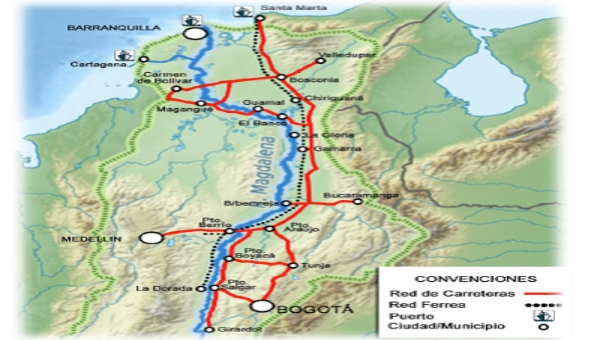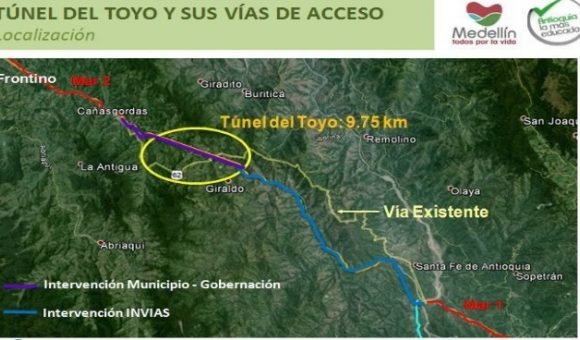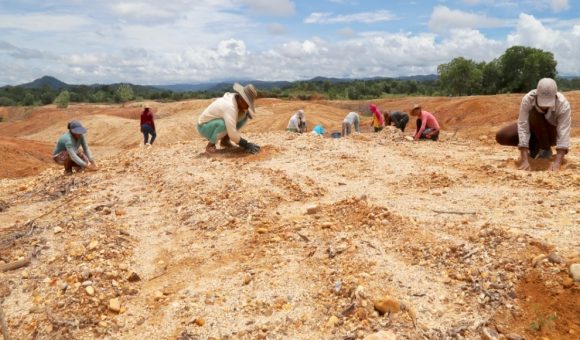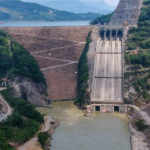Cormagdalena Sets May 11 Deadline for Magdalena River Navigation Financing Data

Cormagdalena – the Colombian government agency overseeing a proposed scheme that would restore commercial navigation on the Magdalena River between the Atlantic Ocean and key inland ports – announced March 29 that it has set a May 11 deadline by which dredging-project proponent Navelena SAS must provide crucial documentation required for project finance.
The Magdalena River dredging scheme is among key infrastructure projects either proposed or underway that would provide huge economic boosts to Medellin and Antioquia, as well as to Colombia generally (see Antioquia, Medellin to See Huge Economic Boost from Infrastructure Projects, Medellin Herald, November 5, 2015).
The “public-private association” (APP in Spanish initials) that would undertake the COP$2.5 trillion (US$877 million), 900-kilometers-long project would open-up new freight-shipping opportunities all the way from Barranquilla (Atlantic Coast) to Barrancabermeja (Ecopetrol refinery site) and onward to Puerto Berrio, Puerto Triunfo and Puerto Nare (in Antioquia) and finally Puerto Salgar (Cundinamarca).
Once studies and financing are completed, the dredging project itself would take about five years to complete, according to Navelena.
“After examining the documents submitted by Navelena SAS within the legal deadline (11 March 2016), and in strict compliance with the contract, Cormagdalena on Tuesday (March 29) submitted its observations and requested provision of additional information to achieve financial closure on the APP for recovery of the Magdalena River,” according to Cormagdalena.
“The information received [from Navelena] is still insufficient and we have therefore asked Navelena to expand the documentation and additional information to meet the full specific requirements set forth in the APP contract.
“Cormagdalena cited May 11 as the deadline for [Navelena’s] response for associated comments. As specifically established by the APP contract 001-2014, June 11, 2016, is the deadline for accreditation of financial closure.”
Fedesarrollo Study
On a related front, Colombian think-tank Fedesarrollo on March 30 released a new study on socio-economic impacts of the proposed Magdalena River dredging project.
According to the study, the dredging project would generate immediate economic benefits of between COP1.158 trillion (US$385 million ) to COP2.254 trillion (US$750 million), increase Colombia’s global competitiveness and “possibly reduce the price of goods by reducing transportation costs.”
The project also would provide “environmental benefits by reducing CO2 emissions generated by road transport, as well as less maintenance of roads by reducing [truck] traffic,” according to Fedesarrrollo’s study.
For each peso invested, 4.2 pesos of economic benefits would result, according to the study.
“However, for these benefits to materialize, the project requires complementary investments to ensure multimodality and allow access to different regions of the country. Investments being made in 20 river ports along the [Magdalena] river and road connectivity through 4G [‘fourth-generation’ highway] projects are key elements for the success of the project,” according to the study.
“Although at present the Magdalena River does not have the same importance it had in the past, it remains the main source of economic and food resources for the inhabitants near its banks. It is also the main means of communication of some communities, and a major source of water supply of the municipalities.
“This implies that any intervention work performed in the Magdalena project should take into account environmental factors as well as social, economic and political activities that affect coastal populations. Navelena has been doing this kind of work with communities to ensure good results,” according to the study.
















